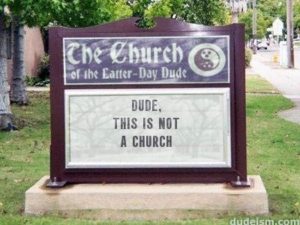As some kind of Christian most, if not all, of my life I have always taken for granted – even if at times “taking” it also meant wanting to “leave” it – something called the church.
The very title of this blog, i.e., “the church and postmodern culture”, assumes there is actually something “there” (a true Aristotelian todi ti) when we speak of the church.
The crux of all theological venturing and scriptural exegeting, therefore, rests on the strategic position, or apposition, of the thing-like something known as “church” in regard to something else – e.g., the church and the political order, the church in the world, the church against social injustice, etc., etc.
 But what if there were no such thing as the church, and there never was supposed to be one? Such a thought is mind-numbing and if you work for the global church production, design, propagation, and marketing industry, including its vast nexus of support bodies “vendors,” and “suppliers”, you are probably ready to pull the red alarm lever and switch to full fight-or-flight mode.
But what if there were no such thing as the church, and there never was supposed to be one? Such a thought is mind-numbing and if you work for the global church production, design, propagation, and marketing industry, including its vast nexus of support bodies “vendors,” and “suppliers”, you are probably ready to pull the red alarm lever and switch to full fight-or-flight mode.
Now please don’t get me wrong. I am not about to make the familar, jaded pitch of urban lumpen-professionals and übersophisticates for why it’s not worth “going to church”, or how it is far more meaningful and personally fulfilling to spend a Sunday morning burning 700 calories of belly fat on a bike ride before settling down with a good cup of fair-trade coffee and a plate of crepes at an outdoor breakfast bistro while discussing the impossibility of democracy in the Middle East with the woman you met yesterday in the dog-walking park in the back of your uptown, faux brownstone condo complex.
Need for Some “Hyperbolic Doubt”
Let’s me suggest that when it comes to church, however, we need to do with our ecclesiology what Descartes did with epistemology in the seventeenth century. We need to try the method of “hyberbolic doubt” and clear away all the crypto-conceptual and pseudo-pragmatic rubbish that gets in the way of understanding what Jesus really meant, or might actually have meant, when he in Matthew 16:18 he declares he is founding on the “rock” (petros), as the immediate upshot of Peter recognizing him as messiah, his new “church”, or ekklesia.
This particular passage, of course, has served as a never flagging focus of contention for doctrinal disputes about the nature of the church, especially the Roman Catholic claim that it legitimates the historical institution of the papacy. It is not my intention to stir the hermeneutical stewpot any further, or to cloud the picture even more by linking this “foundational” passage, attributed to the ipsissima verba of Jesus himself, with the familiar Pauline declarations and carefully selected tropes about what it means to be part of something today we would blithely term “Christian community.”
But close consideration of the textual disputes among Biblical scholars themselves, even if we bracket deliberately and strategically the later dogmatic controversies, does allow us to own this particular, critical insight from which we can draw some serious, contemporary theological leverage – namely, that the divine “rationale” for the church itself has everything to do with God getting the job done of restoring his creation and very little to do with making the point that the Christian life is all about fellowship, family values, or even (if we adopt a more “progressive” vocabulary) “service to others.”
One therefore needs first to “doubt away” (following loosely the Cartesian method) everything we have come to assume church is, or is supposed to be. As indicated before, one even has to entertain chucking the very notion that “church” means anything at all, though of course the use, overuse, and abuse of the locution down through the ages has made that semantically and logically a hopeless assignment.
To begin with we can point to the critical lexicological differences between the two words for “church” which occur in the Greek, and show that the specific word (translated of course from the original Aramaic), which implies the opposite of the one Jesus actually is said to have employed, gradually invaded and metastatically changed the meaning of the original.
Throughout the New Testament with the single exception of 1 Corinthians 11:20 the word for “church” is ekklesia, meaning an “assembly” of those who are summoned to come together, in this case by God himself. It is the κοινή Greek equivalent of the Hebrew kehila, referring back to Yahweh’s regular summoning of his people whom he called out of Egypt. In the Biblical tradition an ekklesia always has the force of the manifestation of the divine presence, which always defies somehow calculable timing and location, to which God’s “elect” are required to respond.
As scholars have noted, this traditional meaning of ekklesia pervades the New Testament, especially in Acts where it is used over and over to characterize the doings or “responses” (praxeis) of the apostles to Jesus’ own summons after the Resurrection to his followers to undertake the Great Commission. If there is one theological point that can easily, but surely not without controversy, be adduced from this observation, it is that from an inaugural vantage point the Church is the Great Commission – nothing more, nothing less.
The Commodification of the Idea of “Church”
 However, the question whether the Church (especially if we capitalize the word) has any substantive sense has always been, and is still, up for grabs. It has become a commonplace among postmodern “theo-critical” types to nod their heads reflexively when it is asserted that the church is not a building, but when it comes to denying more insistently that the church is even an “organization,” the knives will inevitably come out.
However, the question whether the Church (especially if we capitalize the word) has any substantive sense has always been, and is still, up for grabs. It has become a commonplace among postmodern “theo-critical” types to nod their heads reflexively when it is asserted that the church is not a building, but when it comes to denying more insistently that the church is even an “organization,” the knives will inevitably come out.
In this hippest and most innovative age of new ways of laying out the key markers for how one should identify themselves as a “Christ follower,” organizational and management theory completely overshadow whatever is left of the theological underpinnings of any viable ecclesiology. “How to do church” in every more creative and successful ways is the popular corporate self-help genre read religiously by the new “relational” experts advising the countless entrepreneurs of the Christian community-manufacturing sector of the global economy.
The commodification of church, even it is now by and large a virtual commodity or a new type of “intellectual capital” invested in the worldwide “knowledge economy”, is something, like the poor, Jesus probably would have noted we will always have with us. In fact, this commodification began in earnest in the fourth century when the Greek kyriakos (from which the English word “church” etymologically derives), meaning some object or building “dedicated to the Lord”, began to displace ekklesia.
The shift, of course, can be explained to a major extent by the post-Constantinean habit of rededicating pagan shrines and temples en masse to Christos. But it also mimes the dramatic shift of the Jew-Greek spectrum of Christian thinking to the latter side and what we might term the “radical localization of presence” from the Edict of Milan onwards , replacing the New Testament militant eschatology of basileia tou theou (“the active sovereignty of God”) with Augustine’s “city of God.”
A city, of course, is made up of individual houses, where the comfort-giving gods of the hearth downgrade the apocalyptic shock and awe of the “coming of the Son of Man” to one’s own personal and pragmatic “focus on the family”, converting the greater prophetic vision of God’s planetary politeia into the private paideia of what today we know as “Christian education” and private, or small-group, spiritual discipline.
Finding a New “Archimedean Point” for Discourse on Church
But let’s go back to what maybe Jesus had in mind when he actually “founded” his ekklesia. Like location in the restaurant business, context is everything when deciphering enigmatic scriptural passages. And thus it is the context of Jesus’ own utterances here that we begin to rethink a new starting or “Archimedean” point (as Descartes called it) for a twenty-first century ecclesiology.
In verse 13 of the same chapter Jesus queries his disciples as to whom they think the “Son of Man”, a self-referential term he invokes throughout his ministry, really is. The immediate answers offered by the disciples are rather unimaginative and perfunctory, the equivalent of telling Jesus that he’s just another cool, first-century Jewish celebrity with a certain quirky charisma.
But suddenly Peter pipes up with what is most outrageous and obvious at the same time: “well, maybe you’re actually this awesome and earth-shaking figure everyone wants to come, but probably doesn’t really believe will ever actually come. Dude, you’re the messiah!”
 Today most Christians are accustomed to mouthing that line (minus the “dude”) without even the foggiest idea of what it meant then, let alone now. What they don’t understand is the coming of the messiah, even in Jesus’ day, was a truly climactic and internationally “game changing” event that would have had not only profoundly spiritual, but genuinely outsize political ramifications.
Today most Christians are accustomed to mouthing that line (minus the “dude”) without even the foggiest idea of what it meant then, let alone now. What they don’t understand is the coming of the messiah, even in Jesus’ day, was a truly climactic and internationally “game changing” event that would have had not only profoundly spiritual, but genuinely outsize political ramifications.
It is no wonder that the Romans were wary of anyone who might have dared to assume such a title, since they would have challenged not only the political hegemony of Rome at its Eastern margins, but the very cultural and philosophical principle of auctoritas by which the empire itself was founded. Peter’s “undeconstructible” identification of Jesus as the messianic force (we are doing our own Derridean reading here, of course) that is finally taking hold in his people’s midst in such a way that it will soon upend the entire known socio-political and even “cosmic” order of things seals once and for all what is really intended by the construct of ekklesia.
The proclamation of “church” in this sense is tantamount to naming the visible messianic advent itself, the very “lightning” that accompanies the revelatory “coming”, or “full presence” (parousia), of the heretofore mysterious “Son of Man” himself (Matthew 24:28).
The church is nothing more or less than the sign of, and the summons (ekklesia) to manifest and make ever more evident for future generations, the Great Event itself on which Christianity is ultimately founded. It is a constant witness to the event, but the witness is not so much verbal as physical and relational.
If Jesus had wanted his “testimony” to be a series of assertions, or a string of propositions, he would not have “appeared” to the disciples after Easter morning, let alone asking Thomas to place his hands on the wounds. He would have left something like Joseph Smith’s golden tablets.
Christianity is High-Touch, Not High Tech
Christian revelation has always been “high touch” rather than high tech. The “church” is the incarnational intimacy of the “real presence” of the living Lord of all history that is only made possible in real and authentic relationships that can never be conjured up through environmental esthetics, group dynamics, or organizational engineering, but through the interpersonal transparency and confessional authenticity of of finite, fractured, and transformed subjects, who are willing to shed their narcissistic preoccupations and be open to the active power of the living God not only in their immediate personal lives, but in what I would call the larger schesesphere (from the Greek σχέση for “relationship” or “close connection”).
 The growth of this “schesesphere” – something which Luther in his early theology recognized as the key to the meaning of “church”, when he stated that Christ is always “for us” or “in relation to us” and that the church itself is the eschatological reality of becoming “Christs to each other” – can be aided by an infinite variety of organizational game plans and logistics. But if incarnational intimacy is missing, there is no “church” in this most simultaneously real and profound measure of the term.
The growth of this “schesesphere” – something which Luther in his early theology recognized as the key to the meaning of “church”, when he stated that Christ is always “for us” or “in relation to us” and that the church itself is the eschatological reality of becoming “Christs to each other” – can be aided by an infinite variety of organizational game plans and logistics. But if incarnational intimacy is missing, there is no “church” in this most simultaneously real and profound measure of the term.
If “church” is the passing, yet ongoing, traceworks of God’s evental and relational manifesting in the realm of the interpersonal (as echoed in Jesus words about “two or three gathered together”), then one does not “go to church”. Nor does one “take anybody to church.”
Church is no longer a noun substantive, but a transitive verb, and we are always the direct object of God’s action. In other words, we let God “church” us whenever we we do with the two or three what he has in mind for that moment in time.
Yes, Virginia, there is no such thing as church in the sense of a “place” or “space”. But the church does have a “face”, and it is the face of the other, as Levinas would say, who summons us into genuine relationship and thereby into the presence of the Most Holy.
There is no-thing known as the church. But there is the awesome charge of God upon your life to enter into relationship with whom and whomever else he “calls” into his sphere of revelatory, relational intimacy with each other.
In other words, church is “just us”, committed to each other in faithful relationship to each other.
We all need keep that in mind next time we walk into a Christian bookstore and pick something off the shelf that claims to explain how we can make use of such a problematic word as “church”.
Carl Raschke is Professor of Religious Studies at the University of Denver and senior editor of the Journal for Cultural Theory. He has published numerous books on contemporary philosophy, culture, and theological thought, including most recently GloboChrist (Baker Academic, 2008), Postmodernism and the Revolution in Religious Theory (University of Virginia Press, 2012, Critical Theology: A Primer (IVP Academic, 2015), and Force of God: Political Theology and the Crisis of Liberal Democracy (forthcoming). He is also co-founder of the Global Art & Ideas Nexus as well as one of the faculty for the Global Center for Advanced Studies. More information as well as videos of lectures and talks can be found at http://www.carlraschke.com.